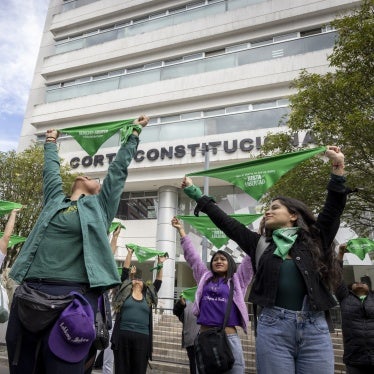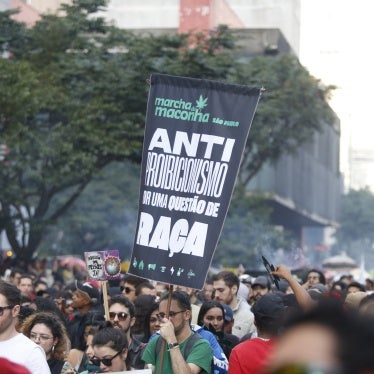(Washington, DC) - The Government of Panama should ensure that a thorough and impartial investigation is conducted into possible abuses during violent confrontations between police and strikers from July 8 to 11, 2010, in Bocas del Toro province, Human Rights Watch said today. At least two people died and hundreds were injured.
In a report released on July 16, Panama's human rights ombudsman cited credible evidence that the police used excessive force against protesters. Local media reported that more than 100 protesters were injured and that at least 2, and perhaps as many as 10, died.
On July 21, President Ricardo Martinelli established an eight-member special commission to investigate. Yet government officials issued a "preliminary report" and made public statements the same day blaming the protesters for the clashes.
"Rather than trying to shift the blame, Panamanian authorities should ensure that those responsible for the abuses are brought to justice," said José Miguel Vivanco, Americas director at Human Rights Watch. "The special commission could help clarify what happened, but it is no substitute for criminal prosecutions."
On July 2, the Banana and Associated Industries Workers' Union called a national strike to protest a new law that would restrict trade union activities. On July 8, violence erupted in the Changuinola district of Bocas del Toro after police confronted protesters who were blocking roads. One protester died and others were injured in the resulting clashes, with more deaths and injuries on subsequent days. The violence ended on July 11, when representatives of the government, the union, and the Catholic Church signed an agreement to temporarily suspend controversial aspects of the new law.
The ombudsman's report found that the police had failed to follow protocols for crowd control and that the severity of the injuries constituted "a clear and excessive abuse of force." The report said that dozens of people were blinded in one or both eyes as a consequence of birdshot pellets fired by the police. The ombudsman also reported that some protesters were arrested in violation of their right to freedom of assembly.
The ombudsman's report also contained interviews with police and a prominent community leader who alleged that some of the protesters were carrying firearms. Police further alleged that many of the protesters were carrying machetes and were throwing rocks and Molotov cocktails - makeshift gasoline bombs - at police units. Local media also reported that protesters set banks, public buildings, and private businesses on fire.
The United Nations Basic Principles on the Use of Force and Firearms by Law Enforcement Officials provide that authorities shall, as much as possible, apply non-violent means before resorting to the use of force and firearms. The principles provide that if the lawful use of force and firearms is unavoidable, then the authorities must use restraint and act in proportion to the seriousness of the offense. Lethal force may be used only when absolutely necessary in order to protect life. The principles also call for an effective reporting and review process, especially in the event of death and serious injury.
On July 21, the same day the government announced the creation of a special commission to investigate the incidents in Bocas del Toro, it also released a "preliminary report" to the media. The report, "The Other Side of the Coin," alleges that an alliance of trade unions, nongovernmental organizations, and political activists instigated the violence in Bocas del Toro and that the group had previously received training in urban combat. That same day, a cabinet minister reportedly repeated these charges in a radio interview.







